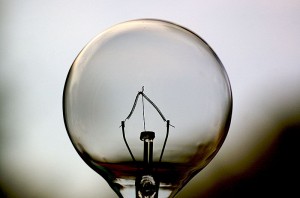 If cleantech is going to have its “Netscape moment,” as John Doerr put it, it’s most likely going to come from companies taking a data-oriented approach.
If cleantech is going to have its “Netscape moment,” as John Doerr put it, it’s most likely going to come from companies taking a data-oriented approach.
Yes, the rise of the smart grids will bring forth billion-dollar markets in traditional IT technologies too — grids and routers and networking juice that companies where some formidable players are already at work, like Cisco and smart meter giant Itron, which inked a partnership in September to deliver a “definitive” smart grid platform.
But all that stuff is kind of tired — any new industry needs IT and hardware. It’s data that you don’t hear much about just yet. The smart grid is all about generating data on energy use, but the next wave of innovation and investment is all about making that data useful and producing it in real time. The opportunities opening up in data-driven cleantech businesses could well be billion-dollar markets, too.
Some companies already doing it include Genscape, which collects information that helps energy traders make better bets in the trillion-dollar energy markets. Weather is huge too. At the conference, Google appeared to be interested in harnessing weather data for cleantech, and WeatherBill — founded by two ex-Googlers in 2006 — is using weather data to serve weather-linked insurance policies, but could have application in energy markets. WeatherBug is also using weather data to make a direct play for the smart grid market.
GreenBeat 2010 innovation competition winner Redwood Systems offers networked lighting for data centers that reduces energy consumption — but says that its system of sensors generates hugely accurate data about energy efficiency in other parts of the center.
“We can tell if a door has been left open” just by looking at its data from its sensors, the company’s VP of marketing Jeremy Stieglitz told me — which in turn can be used to generate additional energy savings. EcoFactor’s smart thermostat system does a similar thing, using data points like weather and energy pricing to mete out overall savings.
Data also makes sense because it can be much more capital efficient than some of the extremely pricey cleantech investments that have turned out to be — oh, let’s call them mistakes. Solar panel maker Solyndra reportedly got $1 billion in investment dollarsand won a Department of Energy flagship conditional loan guarantee worth $535 million, but this week announced it would close its first factory.
That’s why cleantech investment is on a downward swing, according to new reports from the Cleantech Group and Ernst & Young. But the venture capitalists who we spoke to at GreenBeat 2010 say that there’s still plenty of activity in cleantech, it’s just going to be geared towards more capital efficient investments from here on out.
In the GreenBeat smart grid investing panel, Paul Holland, general partner at Foundation Capital drove home that point.
“I think the excitement is here. It’s a little smarter. That’s what happens when these corrections occur,” Holland said.
To be sure, many venture capital firms are going back to their roots in IT-based cleantech investments — after all, IT is what Silicon Valley does best. But based on the buzz at GreenBeat 2010, it looks like the next big wave in cleantech is in data.
[Image via Wikipedia Commons/Jeff Kubina]

